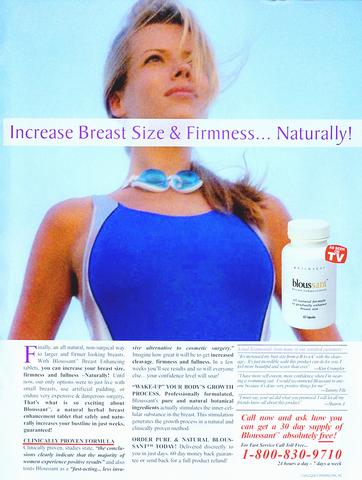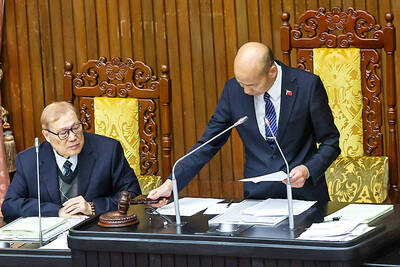In the pages of the fall issue of Teen Vogue -- a publication from Conde Nast aimed at pre-teenage and early-teenage girls -- back-to-school fashion spreads and a boy-band interview are mixed with advertisements for Skechers sneakers, Neutrogena acne cream and L'Oreal lip gloss.
There is also a first for the magazine: a full-page advertisement for Bloussant Breast Enhancement Tablets features a young woman in a bathing suit, her hair wind-tossed and her cleavage prominent.
The manufacturer, WellQuest International, describes the herbal potpourri in the ad copy as a "less invasive alternative to cosmetic surgery" that will endow Bloussant customers with "increased cleavage, firmness and fullness." Testimonials in the ad cite the valuable rise in self-esteem and confidence that came with larger breasts.

PHOTO: NY TIMES
Seventeen's September issue has a one-quarter page ad for Bloussant tablets on page 331. It is at least the third ad for for the product in the last two years, said Jennifer Maguire, the Seventeen spokeswoman.
Self-esteem and confidence are, of course, important issues for a magazine aimed at teenage girls. But the question of whether bigger breasts will make a teenager or pre-teenager more confident, and the propriety of running such an advertisement in a magazine catering to a young readership has been cause for debate among the editors and publishers of magazines for teenagers.
Some magazine executives argue that teenage girls are old enough to know the difference between advertising and editorial content. Others say that the advertisements' suggestion that bigger breasts are an important component of beauty is objectionable for a young, sometimes impressionable audience.
And as the marketplace for these magazines expands and the teenage population grows, the issue could evolve into a debate about sensitivity in the magazine industry at a time when it is suffering a drought of advertising.
In Teen Vogue, the Bloussant ad is given premium placement, appearing in the first half of the magazine, considered valuable real estate for advertisers because readers pay closer attention to ads near the front of the magazine. Typically, in the rare cases when teenage magazines have accepted such advertising, the ads have run small and toward the back.
Almost all the major magazines aimed at teenage girls do not accept ads for breast-enhancement pills, because, their publishers and editors said last week, they do not want to encourage young women to feel that breast size is linked to beauty or self-esteem.
YM, published by Gruner & Jahr, has run occasional quarter-page ads for breast-enhancement tablets in the past, but the editor, Annemarie Iverson, and the publisher, Laura McEwen, who both came aboard last year, decided to refuse the ads. CosmoGirl, published by Hearst Magazines, also rejects the ads, as does Elle Girl, of Hachette Filipacchi, which will introduce its first issue next month. Teen Magazine, published by EMAP USA, a division of Primedia, also refuses to run the ads.
Lynn Lehmkuhl, the president of Teen Magazine, said that under her authority Teen would never accept ads for breast-enhancement products.
"I know I would reject that Bloussant ad, and I hope that everyone else would too," she said. "Teen Vogue's staff is not immersed in knowledge of the teen market, and I don't think they are yet cognizant of the responsibility they have to the teen audience."
Elle Girl, which arrives on newsstands next month, refused the Bloussant ad during the summer. Linda Mason, the publisher, said that the magazine's editor in chief, Brandon Holley, was especially repulsed by it.
"She felt it was fiercely antithetical to the philosophy of the magazine, and so did I," Mason said. "Brandon is all about celebrating your independence, your individual style, and we felt that the message in that ad was `You are clearly not perfect the way you are.' It's not an offensive ad, but we just don't think it's right for teenagers."
Amy Astley, the editor of Teen Vogue, said she was confident her readers knew that an advertisement was not an endorsement by the editors.
"I am personally committed to having Teen Vogue promote images of health and well-being for our readers," she said. "I would like to emphasize that this is advertising and not editorial."
Astley says she does not consult the publishing side to determine which ads are appropriate for the magazine. Asked if she would mind having the Bloussant ad appear in Teen Vogue again, she said, "I would prefer if it did not."
Teen Vogue's publisher, Richard Beckman, declined to comment.
Apart from the propriety of placing the ads, there is little evidence to suggest that the tablets -- which cost US$229.95 for an eight-week supply, according to the WellQuest Web site -- actually achieve what the ad promises. A call to a WellQuest spokesman, Michael Ackerman, was not returned.
While over-the-counter drugs are subject to Food and Drug Administration regulation, herbal supplements are essentially unregulated and are assumed safe unless proved otherwise. But the effects of the herbal combinations that make up many supplements have not been studied.
Bloussant Breast Enhancement Tablets consist of four herbal ingredients: don quai, black cohosh, fennel seed and saw palmetto. According to a spokeswoman for the FDA, the agency has not received complaints about the Bloussant tablets.
But Bill Gurley, a professor of pharmaceutical sciences at the University of Arkansas College of Pharmacy and the author of several studies on herbal remedies, said the tablets pose a potentially serious threat of drug interaction. The herbal concoction could have adverse side effects when taken with other medications a teenager might be taking, like antihistamines or birth control pills, and lessen or intensify the efficacy of the prescribed drugs.
"And on top of that, I would say that the possibility they increase breast size is slim to none," he said. "The likelihood that you're going to go from an A to a C or D is remote. And with young girls, body image is a big deal and they fall prey to some of that stuff."

DEFENDING DEMOCRACY: Taiwan shares the same values as those that fought in WWII, and nations must unite to halt the expansion of a new authoritarian bloc, Lai said The government yesterday held a commemoration ceremony for Victory in Europe (V-E) Day, joining the rest of the world for the first time to mark the anniversary of the end of World War II in Europe. Taiwan honoring V-E Day signifies “our growing connections with the international community,” President William Lai (賴清德) said at a reception in Taipei on the 80th anniversary of V-E Day. One of the major lessons of World War II is that “authoritarianism and aggression lead only to slaughter, tragedy and greater inequality,” Lai said. Even more importantly, the war also taught people that “those who cherish peace cannot

STEADFAST FRIEND: The bills encourage increased Taiwan-US engagement and address China’s distortion of UN Resolution 2758 to isolate Taiwan internationally The Presidential Office yesterday thanked the US House of Representatives for unanimously passing two Taiwan-related bills highlighting its solid support for Taiwan’s democracy and global participation, and for deepening bilateral relations. One of the bills, the Taiwan Assurance Implementation Act, requires the US Department of State to periodically review its guidelines for engagement with Taiwan, and report to the US Congress on the guidelines and plans to lift self-imposed limitations on US-Taiwan engagement. The other bill is the Taiwan International Solidarity Act, which clarifies that UN Resolution 2758 does not address the issue of the representation of Taiwan or its people in

The Philippines yesterday criticized a “high-risk” maneuver by a Chinese vessel near the disputed Scarborough Shoal (Huangyan Island, 黃岩島) in a rare incident involving warships from the two navies. The Scarborough Shoal — a triangular chain of reefs and rocks in the contested South China Sea — has been a flash point between the countries since China seized it from the Philippines in 2012. Taiwan also claims the shoal. Monday’s encounter took place approximately 11.8 nautical miles (22km) southeast” of the Scarborough Shoal, the Philippine military said, during ongoing US-Philippine military exercises that Beijing has criticized as destabilizing. “The Chinese frigate BN 554 was

LEISURE: The new law adds Confucius’ birthday, the anniversary of the Battle of Guningtou, Constitution Day and Little New Year as national holidays The Legislative Yuan yesterday passed new legislation adding four national holidays and making Workers’ Day a national holiday for all sectors. The Chinese Nationalist Party (KMT) and the Taiwan People’s Party used their combined majority in the legislature to push the jointly proposed draft through its third and final reading. This new law supersedes the existing regulations for the implementation of memorial days and state holidays, which are administered by the Ministry of the Interior. The new law recognizes Confucius’ birthday on Sept. 28, the anniversary of the Battle of Guningtou on Oct. 25, Constitution Day on Dec. 25 and “Little New Year,”